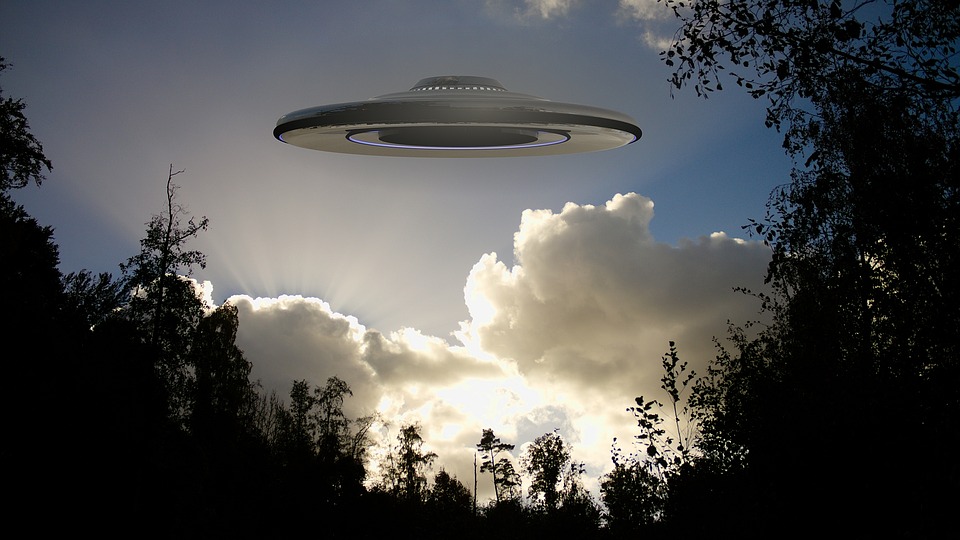Grant Cameron and T. Scott Crain Jr.’s book examines the alleged government involvement in UFO crash retrievals
04/20/2025 / By Kevin Hughes

- The book “UFOs, MJ-12, and the Government” by Grant Cameron and T. Scott Crain Jr. centers on the 1947 Roswell incident, presenting it as a pivotal event in UFO history, with evidence suggesting a deliberate government cover-up of an extraterrestrial encounter rather than a simple misidentification.
- The authors explore the controversial MJ-12 documents, which allegedly detail a secret government group managing UFO affairs. They provide a balanced examination of the documents’ authenticity, highlighting both supporting evidence and skepticism, and suggest that these documents may contain elements of truth despite potential disinformation.
- Cameron and Crain argue that the U.S. government has engaged in a sophisticated campaign of counterintelligence and disinformation to obscure the truth about UFOs. They detail the involvement of high-ranking officials and the existence of a shadowy organization known as MJ-12.
- The book delves into the lives and careers of key figures such as Dr. Eric A. Walker, Dr. Robert I. Sarbacher and Wilbert B. Smith, who were allegedly involved in classified government research related to UFOs. The authors present evidence of their deep entrenchment in the UFO phenomenon and the government’s efforts to manage the narrative.
- Beyond the immediate question of government involvement, the book explores the potential technological advancements and societal impacts of UFO disclosure. It calls for transparency and open dialogue, urging the U.S. government to reveal its knowledge and activities related to UFOs.
In the ever-evolving landscape of UFOlogy, few topics ignite as much intrigue and controversy as the alleged government involvement in UFO crash retrievals. Grant Cameron and T. Scott Crain Jr.’s book, “UFOs, MJ-12, and the Government,” delves deep into this enigmatic subject, offering a meticulously researched and compelling narrative that challenges conventional wisdom and beckons readers to reconsider their understanding of extraterrestrial encounters and government transparency.
The book opens with a riveting account of the infamous Roswell incident of 1947, a watershed moment in UFO history. The authors meticulously dissect the events surrounding the purported crash of a flying saucer near Roswell, New Mexico, and the subsequent government response. They present a compelling case, drawing on declassified documents, eyewitness testimonies and the controversial Majestic-12 (MJ-12) documents, which purport to detail a secret government group tasked with managing UFO-related affairs.
Cameron and Crain argue that the Roswell incident was not merely a case of misidentification, as the official narrative suggests, but rather a deliberate cover-up of an extraterrestrial encounter. They highlight the inconsistencies and contradictions in the government’s explanation, suggesting a concerted effort to conceal the truth from the public.
Central to the book’s narrative is the exploration of the MJ-12 documents, which have sparked fierce debate within the UFO community. The authors provide a comprehensive overview of the documents’ origins, content and the ongoing controversy surrounding their authenticity.
The book shines a spotlight on several key figures whose lives and careers intersect with the UFO phenomenon. One such individual is Dr. Eric A. Walker, a former president of Pennsylvania State University and a purported member of MJ-12. Through interviews, correspondence and archival research, the authors piece together a portrait of a man deeply entrenched in the world of classified government research.
Cameron and Crain’s investigation into Walker’s involvement is particularly fascinating. They recount their attempts to engage with Walker, who alternately evaded, denied and obfuscated their inquiries. The authors present a compelling case that Walker was privy to sensitive information regarding UFO crashes and government efforts to conceal them.
Similarly, the book delves into the roles of Dr. Robert I. Sarbacher, a physicist with connections to the U.S. Department of Defense and Wilbert B. Smith, a Canadian engineer who claimed to know U.S. government UFO research. The authors argue that both men played significant roles in the unfolding drama of government UFO secrecy.
One of the book’s most compelling aspects is its exploration of the tactics employed by government agencies to manage the UFO narrative. Cameron and Crain suggest that the U.S. government has engaged in a sophisticated campaign of counterintelligence and disinformation to obscure the truth about UFOs. They argue that the release of the MJ-12 documents and the subsequent controversy may have been part of a larger strategy to confuse and mislead researchers and the public.
The authors highlight the challenges faced by UFO investigators in navigating this labyrinth of misinformation. They recount instances of intimidation, harassment and the deliberate dissemination of false information, underscoring the high stakes involved in the pursuit of UFO truth.
Beyond the immediate question of government involvement, the book also explores the broader implications of UFO technology. Cameron and Crain suggest that the U.S. government may have sought to reverse-engineer alien technology, potentially leading to significant advancements in military and civilian applications. They cite the development of stealth technology and other cutting-edge innovations as evidence of the potential influence of UFO-derived knowledge.
The authors also consider the societal impact of UFO disclosure, drawing on historical precedents and expert analyses. They argue that the gradual acclimatization of the public to the idea of extraterrestrial life may be part of a long-term strategy to prepare society for the eventual revelation of the truth.
In conclusion, “UFOs, MJ-12 and the Government” is a masterful exploration of one of the most enduring mysteries of our time. Cameron and Crain’s meticulous research, coupled with their engaging narrative style, makes for a compelling read that challenges readers to question their assumptions and consider the possibility of a hidden reality.
Watch this video about Grant Cameron and T. Scott Crain Jr.’s book “UFOs, MJ-12 and the Government: A Report on Government Involvement in UFO Crash Retrievals.”
This video is from the BrightLearn channel on Brighteon.com.
Sources include:
Submit a correction >>
Tagged Under:
alien technology, Defense Department, Dr. Eric A. Walker, Dr. Robert I. Sarbacher, extraterrestrial, Grant Cameron, Majestic-12, MJ-12, New Mexico, Roswell, T. Scott Crain Jr., UFO, Wilbert B. Smith
This article may contain statements that reflect the opinion of the author
RECENT NEWS & ARTICLES
Cosmic.News is a fact-based public education website published by Cosmic News Features, LLC.
All content copyright © 2018 by Cosmic News Features, LLC.
Contact Us with Tips or Corrections
All trademarks, registered trademarks and servicemarks mentioned on this site are the property of their respective owners.




















